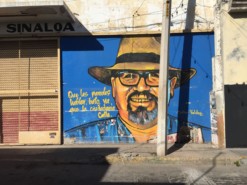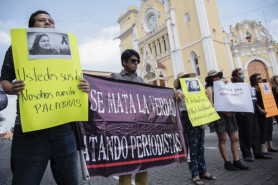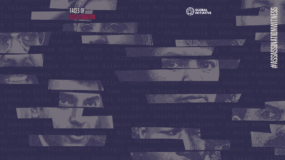Four years after the murder of María Elena Ferral, being a journalist in Mexico remains a deadly business. The international community must step up its support for much-needed reform.
As a journalist in Veracruz, Mexico, María Elena Ferral knew her life was in danger. ‘My mom knew there was a price on her head because there were constant threats,’ said her daughter, Fernanda, after Ferral’s murder. According to international civil society organization Article 19, 163 journalists have been murdered in Mexico since 2000, and another 32 are missing. In 2022, Mexico recorded an attack against journalists or media houses every 13 hours. This makes the country one of the most dangerous places for journalism worldwide, with the state of Veracruz being the deadliest.
Mexico has the third highest levels of criminality in the world, as found by the 2023 Global Organized Crime Index. And while organized crime groups have indeed been linked to many of the killings of journalists in Mexico, it would be a simplistic misrepresentation to attribute these attacks solely to them. These incidents are embedded in a context of political violence in which criminal and state actors are constantly vying for influence. The dominant narrative, which places the blame on cartels, conveniently absolves the state of its significant role in jeopardizing journalists’ safety. Article 19 found that 42 per cent of the attacks are committed by government officials, followed by criminal actors and private entities, but it is the state itself that poses the greatest threat to journalists. And most of these attacks go unpunished.
Independent journalists in Mexico lack social and institutional protection, making them vulnerable to threats and aggression. In addition to murders and disappearances, journalists are victims of verbal attacks, espionage and bogus lawsuits. When analyzing violence targeting journalists in Mexico, it is also important to highlight the additional layer of gender impact. According to the NGO CIMAC, violence against female journalists in Mexico has increased fivefold since 2013. However, the gender perspective is rarely used in legal cases, which consistently ignore the additional vulnerability of women in the field.
The dangerous search for justice
Ferral’s story is emblematic of the alarming trend of the increasing risk journalists face in the country, especially female journalists. As a correspondent for El Diario de Xalapa and the owner of the news website Quinto Poder, she covered politics extensively and had political ambitions herself. Ferral had been tempted by the prospect of governing her hometown, Gutiérrez Zamora, a municipality in Veracruz that had only had three female leaders in the past 65 years. Politics offered the chance of a higher income, which was particularly attractive as a single mother and a journalist struggling to find a decent wage. Most journalists in the region do not receive a formal salary from their employers.
On 30 March 2020, she was ambushed in the municipality of Papantla by two men who shot her three times in the abdomen. Ferral died of her wounds in hospital.
To date, four men have been convicted, two of whom are on the run, including Basilio Picazo Pérez, the politician accused of masterminding the murder. Five other men were temporarily detained without being sentenced, including alleged hitman Antonio Zaleta Jiménez. In February 2024, a Veracruz judge authorized Zaleta Jiménez’s release, as the prosecution had failed to prove he was involved in the murder. The judge found violations of due process that could jeopardize the charges and lead to the release of those convicted. Four years after Ferral’s murder, the case is crumbling and there is a significant risk that it will end without the accused being convicted.
Public services available to victims of crime in Mexico are often underfunded and plagued by corruption, meaning that NGOs and journalists are left filling the gaps the state does not provide. Propuesta Cívica, a Mexican NGO that provided legal assistance to Ferral’s family, found that escalating legal costs and dangerous visits to the courts in Veracruz made their financial support unsustainable.
Journalist Miguel León, also from Veracruz, has now taken up the Ferral case. León knows the high price of revealing the names of alleged perpetrators after political assassinations in Mexico. He recognizes that this risk is precisely why Ferral was killed. In March 2018, when her friend and colleague Leobardo Vázquez asked for her help after receiving threatening messages, she sprang into action. She began raising funds to move him to a safe location, but he was murdered before the transfer could take place. After Vázquez’s murder, she tirelessly investigated his assassination while the authorities turned a blind eye. Her findings pointed to the involvement of criminal organization Los Zetas, with little to no effort from law enforcement to seek justice.
León meticulously reviewed all the stories Ferral had pursued before her death. Among them, her coverage mentioning Picazo Pérez stood out. Allegedly, the politician led a group called Totonacapan, leveraging his influence to perpetrate a trail of documented abuses and violence. Ferral had been investigating the murder of a politician who had accused Picazo Pérez of embezzlement. León claims that the killers are aware of his investigation, and continuing to publish about it gives him the visibility he needs to stay alive, as people are following his work. ‘Silence is not an option,’ he told the Global Initiative Against Transnational Organized Crime, echoing a sentiment often heard from journalists in Mexico.
The road ahead
Four years after Ferral’s murder, the course of justice seems to have stumbled to a halt. Since her death, political violence has increased and journalists find themselves even more vulnerable. President Andrés Manuel López Obrador’s approach is far from encouraging: he often uses his platforms to attack and discredit journalists who oppose him.
Mexico has presidential elections in June this year. There are two female candidates at the top of the ticket and it is likely that López Obrador’s close associate, Claudia Sheinbaum, of his MORENA party, will win. However, the election may be the most violent yet: in the first two months of 2024, at least 33 people involved in politics, some aspiring to office, have been murdered.
The greatest danger for Mexican journalists lies in the realm of local criminal governance, where criminal organizations have infiltrated municipal institutions. As election after election has shown, criminal networks use their power to manipulate results, stifle the media and shape political agendas to their advantage. Mexico’s hard-earned democracy is at a crossroads, its foundations weakened by the infiltration of state-embedded criminal actors and the insatiable greed of senior political office holders. The growing influence of criminal organizations, coupled with the government’s militarized response strategies, paints a bleak picture.
Ferral’s murder underscores the high price journalists pay to expose human rights violations, as they navigate threats, violence and a broken protection system. In the face of these challenges, resilient journalists committed to the truth are inspiring change through their work, demanding justice, press freedom and renewed democratic values. The only hope lies with the international community: when murders of journalists have attracted international attention, federal authorities have felt compelled to investigate them further. The only chance for justice may be to take the cases to an international court. Academics, international civil society organizations and the diplomatic community must step up support for front line journalists who are shaping the narrative of a nation in desperate need of reform.
The road to a more just Mexico is fraught with challenges, but with global attention and collective advocacy, a brighter future is possible – one where democracy thrives and the voices of truth prevail.
Cuatro años después del asesinato de María Elena Ferral, ser periodista en México sigue siendo un asunto mortal. La comunidad internacional debe prestar su apoyo a una reforma imprescindible.
Como periodista en Veracruz, México, María Elena Ferral sabía que su vida corría peligro. «Mi mamá sabía que su cabeza tenía precio porque las amenazas hacia ella eran muy constantes», dijo su hija Fernanda tras el asesinato de Ferral. Según la ONG Article 19, 163 periodistas han sido asesinados en México desde el año 2000, y otros 32 están desaparecidos. En 2022, México registró una agresión contra periodistas o medios de comunicación cada 13 horas. Esto convierte al país en uno de los lugares más peligrosos para el periodismo en todo el mundo, siendo el estado de Veracruz el más mortífero.
México es el tercer país del mundo con mayores niveles de criminalidad, según el Índice global de crimen organizado 2023. Y aunque los grupos del crimen organizado han sido vinculados a muchos de los asesinatos de periodistas en México, resultaría simplista atribuir estos ataques únicamente a ellos. Estos incidentes se enmarcan en un contexto de violencia política en el que la criminalidad y el Estado se disputan constantemente su influencia. La narrativa dominante, que culpa a los cárteles, convenientemente absuelve al Estado de su importante papel a la hora de poner en peligro la seguridad de los periodistas. Según datos de Article 19, el 42 % de las agresiones son cometidas por funcionarios del Gobierno, seguidos por actores criminales y entidades privadas, pero es el propio Estado el que representa la mayor amenaza para los periodistas. Y la mayoría de estas agresiones quedan impunes.
Los periodistas independientes en México carecen de protección social e institucional, lo que les hace vulnerables a amenazas y agresiones. Además de asesinatos y desapariciones, son víctimas de ataques verbales, espionaje y demandas falsas. Al analizar la violencia contra los periodistas en México, también es importante destacar la capa adicional del impacto de género. Según la ONG CIMAC, la violencia contra las mujeres periodistas en México se ha quintuplicado desde 2013. Sin embargo, la perspectiva de género rara vez se utiliza en los tribunales, que ignoran sistemáticamente la vulnerabilidad adicional de las mujeres en el campo.
La peligrosa búsqueda de justicia
La historia de Ferral es emblemática de la alarmante tendencia al aumento del riesgo que corren los periodistas en el país, especialmente las mujeres. Como corresponsal de El Diario de Xalapa y propietaria del sitio web de noticias Quinto Poder, Ferral cubría ampliamente noticias políticas. También le había tentado la posibilidad de gobernar su ciudad natal, Gutiérrez Zamora, un municipio de Veracruz que solo había tenido tres mujeres dirigentes en los últimos 65 años. La política le ofrecía la posibilidad de obtener mayores ingresos, lo que le resultaba especialmente atractivo como madre soltera y periodista que luchaba por encontrar un salario decente (la mayoría de los periodistas de la región no reciben un salario oficial).
El 30 de marzo de 2020, Ferral fue interceptada por dos hombres en el municipio de Papantla. Allí recibió tres impactos de bala que perforaron su hígado y sus pulmones. Murió de sus heridas en el hospital.
Hasta la fecha, se ha condenado a cuatro hombres en conexión con el asesinato, dos de los cuales están huidos, entre ellos Basilio Picazo Pérez, el político acusado de ser el autor intelectual del asesinato. Otros cinco hombres fueron detenidos temporalmente sin ser condenados, incluyendo el presunto sicario Antonio Zaleta Jiménez. En febrero de 2024, un juez de Veracruz autorizó la puesta en libertad de Zaleta Jiménez, ya que la fiscalía no había podido demostrar su participación en el asesinato. El juez encontró violaciones al debido proceso que podrían poner en riesgo las otras acusaciones y llevar a la liberación de los sentenciados. Cuatro años después del asesinato de Ferral, el caso se está desmoronando y existe un riesgo importante de que termine sin que los acusados sean condenados.
Los servicios públicos disponibles para las víctimas de crimen en México suelen estar mal financiados y plagados de corrupción, lo que significa que las ONG y los periodistas se ven obligados a llenar los vacíos que el Estado no proporciona. Propuesta Cívica, una ONG mexicana que prestó asistencia jurídica a la familia de Ferral, se vio obligada a cesar su apoyo financiero debido a la escalada de los costes legales y el peligroso viaje a los tribunales de Veracruz.
El periodista Miguel León, también de Veracruz, se ha ocupado ahora del caso Ferral. León conoce el alto precio que supone revelar los nombres de los presuntos autores de asesinatos políticos en México. Reconoce que ese riesgo es precisamente la razón por la que Ferral fue asesinada: en marzo de 2018, cuando su amigo y colega Leobardo Vázquez pidió ayuda a Ferral tras recibir mensajes amenazantes, ella comenzó a recaudar fondos para trasladarlo a un lugar seguro. Trágicamente, Leobardo Vázquez fue asesinado antes de que el traslado pudiera llevarse a cabo. Tras el asesinato de Vázquez, Ferral investigó el caso mientras las autoridades hacían la vista gorda. Sus hallazgos apuntaron a la implicación de la organización criminal Los Zetas, sin que los cuerpos de seguridad hicieran apenas nada por buscar justicia.
León repasó minuciosamente todos los reportajes que Ferral había realizado antes de su muerte. Entre ellas, destacaba su cobertura sobre Picazo Pérez. Supuestamente, el político dirigía un grupo llamado Totonacapan, aprovechando su influencia para perpetrar un sinfín de abusos y violencia documentados. Ferral había estado investigando el asesinato de un político que había acusado a Picazo Pérez de malversación de fondos. León afirma que los asesinos están al tanto de su investigación, y seguir publicando sobre ella le da la visibilidad que necesita para seguir vivo, ya que la gente sigue su trabajo. «El silencio no es una opción», declaró a Global Initiative Against Transnational Organized Crime, haciéndose eco de un sentimiento que se escucha a menudo entre los periodistas mexicanos.
¿Qué depara el futuro?
Cuatro años después del asesinato de Ferral, el curso de la justicia parece haberse detenido. Desde su muerte, la violencia política ha aumentado y los periodistas se encuentran aún más vulnerables. La actitud del presidente Andrés Manuel López Obrador no es nada alentadora: a menudo utiliza sus plataformas para atacar y desacreditar a los periodistas que se le oponen.
México celebra elecciones presidenciales en junio de este año. Hay dos candidatas en primera posición y es probable que gane la estrecha colaboradora de López Obrador, Claudia Sheinbaum, de su partido Morena. Sin embargo, las elecciones podrían ser las más violentas hasta la fecha: en los dos primeros meses de 2024, al menos 33 personas relacionadas con la política, algunas aspirantes a cargos públicos, han sido asesinadas.
El mayor peligro para los periodistas mexicanos se encuentra en el ámbito de la gobernanza criminal local, donde las organizaciones criminales se han infiltrado en las instituciones municipales. Como se ha demostrado elección tras elección, las redes criminales utilizan su poder para manipular los resultados, silenciar a los medios de comunicación y moldear las agendas políticas para su beneficio. La democracia mexicana, que tanto ha costado conseguir, se encuentra en una encrucijada, con sus cimientos debilitados por la infiltración de actores integrados en el Estado y la insaciable codicia de los altos cargos políticos. La creciente influencia de las organizaciones criminales y las respuestas militarizadas del Gobierno dibujan un panorama desolador.
El asesinato de Ferral pone de relieve el alto precio que pagan los periodistas por denunciar violaciones de derechos humanos, al tener que hacer frente a amenazas, violencia y un sistema de protección ineficaz. Frente a estos desafíos, periodistas resilientes y comprometidos con la verdad están inspirando el cambio a través de su trabajo, exigiendo justicia, libertad de prensa y valores democráticos renovados. La única esperanza reside en la comunidad internacional: cuando los asesinatos de periodistas han atraído la atención internacional, las autoridades federales se han sentido obligadas a investigarlos más a fondo. La única posibilidad de que se haga justicia puede ser llevar los casos ante un tribunal internacional. El mundo académico, las organizaciones internacionales y la comunidad diplomática deben intensificar su apoyo a los periodistas de primera línea que están dando forma a la narrativa de una nación desesperadamente necesitada de reformas.
El camino hacia un México más justo está plagado de retos, pero con la debida atención internacional y la defensa colectiva es posible un futuro mejor, en el que prospere la democracia y prevalezcan las voces de la verdad.



